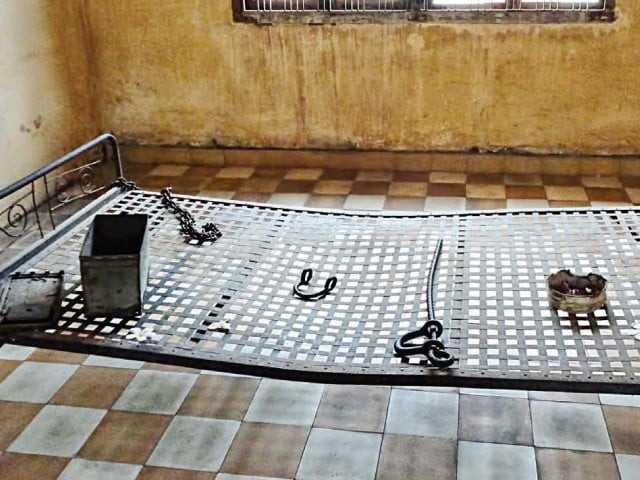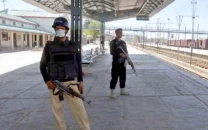Police torture: ‘Most confessions are extracted under duress’
Recent report documents 341 cases of police torture in Faisalabad in 2011.

Police torture: ‘Most confessions are extracted under duress’
Incidents of water boarding and other forms of torture in police custody are on the rise in Faisalabad.
According to the latest figures, the trend to torture people during interrogation has increased considerably in 2011 and claims of the Punjab government ensuring the ‘fundamental rights of prisoners’ ring hollow.
According to a survey conducted by journalists in collaboration with the district administration, 311 complaints have been lodged by victims of police torture in Faisalabad this year on the basis of medical examination. “Hundreds of people went on record and told journalists about their experiences in police stations and a total of 341 complaints were registered alleging police torture this year,” the report stated.
“The use of chittar and other forms of torture during interrogation has increased considerably. Police officials don’t even treat criminals like they are human. They degrade them and beat them without a second thought”, a torture victim said.
Many complaints aren’t moved by the victims due to an ever prevalent fear of the police.
“I am sure there are many more cases of police torture but not many people are willing to go on the record with something like this,” said Saad Bismillah, a torture victim.
“Most people prefer to just pay the cops to let them go. Approaching the courts is expensive and time consuming,” he added.
As per Punjab government procedure, the complaints of the police torture victims can be examined by the District Standing Board (DSB) which is responsible to pronounce verdict on such cases. However, it is a prerequisite that such complaints can only be entertained by courts after a medical examination. After a detailed hearing and adjudication, the case is then referred to the DSB for medical examination and to give opinion about the allegations of the torture.
The DSB is headed by the Medical Superintendent of Divisional Headquarter Hospital with District Surgeon, District Health Officer and District Medico Legal Officer as members. On the basis of the opinion of the DSB, the court orders for initiating proceedings against the responsible police official. “All they say is something completely stereotypical like ‘take appropriate action in accordance with law keeping in view the opinion of the DSB Board’ but there are no follow ups and usually, no action,” said torture victim and former constable Atta Rahman.
Another disturbing fact is that senior police officials often protect, rather reward, officers who torture prisoners.
“Usually it is directly on the orders of senior officials,” he added. The official record of the district medico legal reveals that during the year 2010, a total of 87 per cent complaints of police torture were found true. Likewise, 91 percent complaints received by the DSB from the victims against the police torture were proven true.
“In majority of police torture cases, it was observed that the commonly used weapon is a leather slipper dipped in mustard oil, used for torturing the victims physically.
The resulting injuries range from bruises, contusions, abrasions, lacerations and rarely to fracture of bones,” Dr Raja asserted.
There have also been a number of police torture cases where prisoners experienced water boarding and others where they were starved. “Some prisoners revealed that they were forced to eat food infested with maggots or faeces,” Dr Raja said.
Dr Raja said, “Most of these victims had been detained by the police in illegal custody, after which they were either presented in the court or released without any record almost constant with torture by blunt agents”.
“Rolling of heavy objects, hanging by upper limbs or hanging upside down has also been observed in a few cases. Rollers are used to crush the bones,” he said.
Assistant Professor of Forensic Medicine Punjab Medical College (PMC), Faisalabad, Dr Humaira Rashid, said, “the legal definition of hurt is given in Section 332 of Qisas & Diyat Act 1997 which states “causing pain, harm, disease, infirmity injury, impairing, disabling, dismembering any organ of the body or a part of the body without causing death”. Lawyer Chaudhry Abdul Majeed said, “Police torture cases are increasing alarmingly and the violation of the human rights by law enforcing agencies is normal practice.”
Chaudhry Muhammad Zulfiqar, a criminal lawyer, said that the present police system was not only obsolete but corrupt to the core. “Torture is the only way many police officials know of extracting a confession. They don’t care about whether it is true or not,” he added.
At present the Faisalabad district has 39 police stations and each station maintains a torture cell.
Published in The Express Tribune, October 20th, 2011.



















COMMENTS
Comments are moderated and generally will be posted if they are on-topic and not abusive.
For more information, please see our Comments FAQ